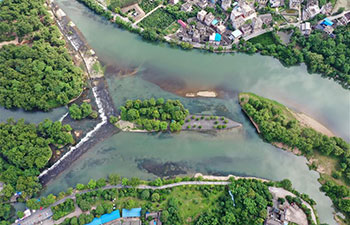NICOSIA, July 2 (Xinhua) -- Cyprus is not within a war zone and panic is not justified as a result of what he called an isolated incident involving an errant S-200 missile, which crashed on a mountain side on Monday, Defense Minister Savvas Angelides said on Tuesday.
The missile is alleged to be fired by the Syrian army during overnight Israeli air raids in the vicinity of Damascus and Homs.
"The war in Syria has been going on for years and this is the first time such an incident happened. So I don't see any reason for concern or panic," Angelides said during a visit of new army conscripts at an army camp.
According to an official handout, Angelides added that the Cypriot government is still investigating the incident in a bid to collect reliable information. The government spokesman said authorities were in touch with Israel, Britain, the U.S. and Russia in a bid to clarify the incident.
"We are assessing the information in cooperation with other neighboring friendly countries to reach our own conclusions on the basis of reliable information," Angelides said.
He said that Cyprus has a reliable anti-missile system and could have detected and intercept the missile, but it was inactive at the time.
He explained that the system can only be activated in time of war and only after a decision by the government giving access to the system to its operators.
The area where the anti-aircraft missile crashed on a mountain side after skimming the capital Nicosia was still cordoned off on Tuesday by Turkish troops which control the northern part of the island.
Experts sent from Turkey to make a survey said they did not detect any toxic substances and assured the public nearby that it was safe to stay in their villages.
An expert told a local newspaper that, based on information released by Turkish Cypriot authorities, he concluded that the missile exploded possibly at the end of its trajectory at a height of 300 meters.
"These missiles have a mechanism of self-destruction in case they fail to hit their target, so as to minimize damage on falling on land," Zenonas Tziarras, of the Geopolitical Cyprus think-tank said.
He also said that this explained the fact that no impact crater had been detected and that pieces of the missile were found in many more places than originally believed.
It was thought that debris was scattered in a small area between three villages, but more pieces were later found in at least four more spots several kilometers away.
The missile is believed to have reached Cyprus within 90 seconds after its firing, probably as a result of jamming that sent it away from its intended targets.












